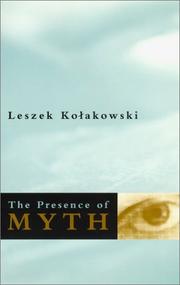| Listing 1 - 4 of 4 |
Sort by
|
Book
ISBN: 2253050733 9782253050735 Year: 1989 Volume: 4106 Publisher: Paris: Grasset,
Abstract | Keywords | Export | Availability | Bookmark
 Loading...
Loading...Choose an application
- Reference Manager
- EndNote
- RefWorks (Direct export to RefWorks)
Cynicism --- Pessimism --- Cynisme --- Pessimisme --- Aphorismes --- Relations hommes-femmes --- sexualité

ISBN: 1555421504 Year: 1989 Publisher: London Jossey-Bass
Abstract | Keywords | Export | Availability | Bookmark
 Loading...
Loading...Choose an application
- Reference Manager
- EndNote
- RefWorks (Direct export to RefWorks)
Cynicism. --- Industrial management --- Work environment --- Work ethic --- Algemene psychologie --- algemene overzichten.

ISBN: 0691073546 0691020728 1400846927 129946209X 9780691020723 9780691073545 Year: 1989 Volume: 2 Publisher: Princeton University Press
Abstract | Keywords | Export | Availability | Bookmark
 Loading...
Loading...Choose an application
- Reference Manager
- EndNote
- RefWorks (Direct export to RefWorks)
A work that "not only treats of irony but is irony," wrote a contemporary reviewer of The Concept of Irony, with Continual Reference to Socrates. Presented here with Kierkegaard's notes of the celebrated Berlin lectures on "positive philosophy" by F.W.J. Schelling, the book is a seedbed of Kierkegaard's subsequent work, both stylistically and thematically. Part One concentrates on Socrates, the master ironist, as interpreted by Xenophon, Plato, and Aristophanes, with a word on Hegel and Hegelian categories. Part Two is a more synoptic discussion of the concept of irony in Kierkegaard's categories, with examples from other philosophers and with particular attention given to A. W. Schlegel's novel Lucinde as an epitome of romantic irony. The Concept of Irony and the Notes of Schelling's Berlin Lectures belong to the momentous year 1841, which included not only the completion of Kierkegaard's university work and his sojourn in Berlin, but also the end of his engagement to Regine Olsen and the initial writing of Either/Or.
Ironie --- Irony --- Sarcasm --- Cynicism --- Rhetoric --- Satire --- Tragic, The --- Understatement --- Schelling, Friedrich Wilhelm Joseph von --- Socrates --- Socrate --- Socrates Constantinopolitanus Scholasticus --- Schelling, Friedrich Wilhelm Joseph von, --- Schelling, F. W. J. --- Schelling, Friedrich Wilhelm Joseph --- Schelling, Federico Guillermo José --- Irony. --- Socrates. --- von Schelling, Friedrich Wilhelm Joseph

ISBN: 0226450414 0226450570 9780226222257 022622225X 9780226450414 Year: 1989 Publisher: Chicago, Ill. University of Chicago Press
Abstract | Keywords | Export | Availability | Bookmark
 Loading...
Loading...Choose an application
- Reference Manager
- EndNote
- RefWorks (Direct export to RefWorks)
"[An] important essay by a philosopher who more convincingly than any other I can think of demonstrates the continuing significance of his vocation in the life of our culture."-Karsten Harries, The New York Times Book Review With The Presence of Myth, Kolakowski demonstrates that no matter how hard man strives for purely rational thought, there has always been-and always will be-a reservoir of mythical images that lend "being" and "consciousness" a specifically human meaning. "Kolakowski undertakes a philosophy of culture which extends to all realms of human intercourse-intellectual, artistic, scientific, and emotional. . . . [His] book has real significance for today, and may well become a classic in the philosophy of culture."-Anglican Theological Review
Philosophy and psychology of culture --- Culture --- Man --- Myth --- Human beings --- #gsdbF --- Homo sapiens --- Human race --- Humanity (Human beings) --- Humankind --- Humans --- Mankind --- People --- Hominids --- Persons --- Demythologization --- God --- Gods --- Mythology --- Religion --- Cultural sociology --- Sociology of culture --- Civilization --- Social aspects --- Culture. --- Human beings. --- Myth. --- Popular culture --- mythology, myth, folklore, culture, media, italy, humanism, politics, political science, cynicism, epistemology, experience, perception, marxism, jung, jesus, religion, faith, belief, understanding, meaning, purpose, nonfiction, philosophy, heidegger, descartes, aquinas, freud, augustine, sartre, spinoza, pascal, nietzsche, marx, plato, husserl, hume, hobbes, leviathan, society, human nature.
| Listing 1 - 4 of 4 |
Sort by
|

 Search
Search Feedback
Feedback About UniCat
About UniCat  Help
Help News
News